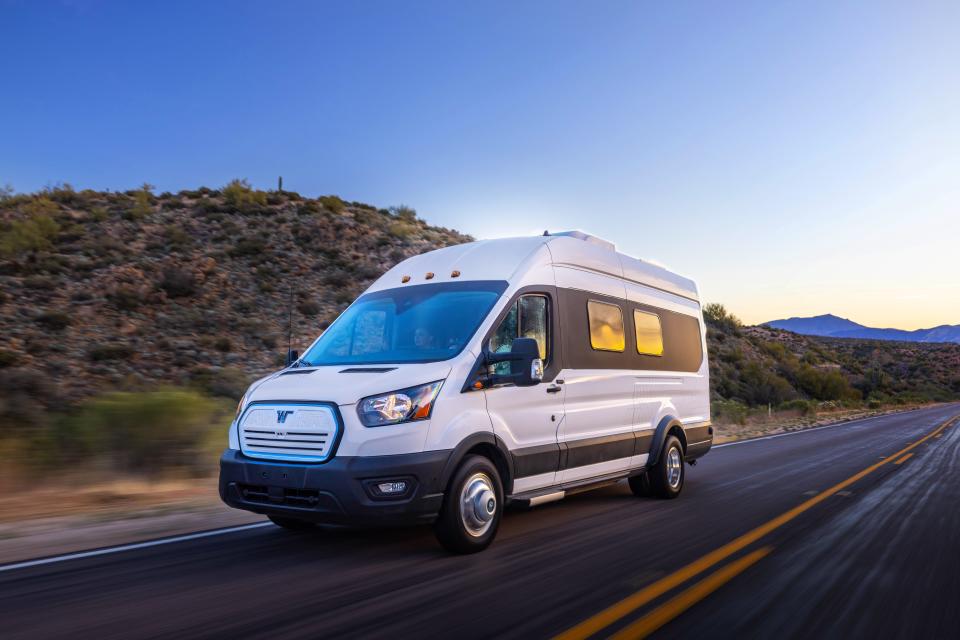Winnebago buys battery maker as it ramps up electric RV production
As it continues to experiment with electric vehicles, Winnebago Industries is buying a lithium-ion battery maker.
The recreational vehicle company on Monday announced the purchase of Clearwater, Florida-based Lithionics Battery for an undisclosed sum. The announcement comes two months after Winnebago displayed a new edition of its electric recreational vehicle concept at the Florida RV SuperShow.
The company, which has several factories in Iowa and was headquartered in the state before moving its offices to a Minneapolis suburb in 2021, will save money on the eventual production its vehicles by owning the battery supplier. In a statement, CEO Michael Happe said the deal will improve Winnebago's "margin profile."

"We see significant opportunity to expand the use of their efficient energy solutions within our own portfolio, to continue to grow relationships with other existing customers and to explore new market applications," Happe said.
Lithionics' founder, Steve Tartaglia, will run the battery line for Winnebago. In addition to RVs, Lithionics makes batteries for amusement park rides, boats, low-speed vehicles and cell towers.
"We will create a range of technologically superior products that will change the way people experience the outdoors," Tartaglia said in a statement Monday.
Ashis Bhattacharya, Winnebago’s senior vice president of business development and advance technology, told the Des Moines Register on Monday that Lithionics will continue to sell its batteries to outside customers, including other RV manufacturers. He said the division will create internal controls to protect other customers' information.
Winnebago has used Lithionics batteries for some recreational vehicles since 2018, using the product as a source of "house power" that generates electricity for vehicle features like microwaves, water heaters and air conditioning. Winnebago's acquisition comes after California lawmakers introduced a rule that will require recreational vehicles to do away with the traditional, gas-powered generators that most recreational vehicles have relied on.
Bhattacharya said the acquisition should help Winnebago's other lines of vehicles and boats adopt to lithium-ion batteries faster. He said the battery division should be able to provide more detailed tweaks to the products to fit vehicles' specific needs.
"It will be more convenient for us to have those discussions earlier on," he said.
Winnebago pushes multiple electric vehicles
Winnebago debuted its first electric vehicle concept in January 2022. At the time, company officials said the vehicle had a 125-mile cruising range.
Its second concept vehicle, released earlier year, is built on the Ford E-Transit electric van chassis. That chassis only has a published range of 108 miles. But Winnebago officials said in a news release that they were "actively pursuing range extension opportunities."

In addition to the electric RV, Winnebago debuted a concept electric boat under its Chris-Craft brand in February.
Battery maker purchase comes after a couple of big years
The company did well in the first two years of the COVID-19 pandemic, as families opted for outdoors activities like camping that would allow them to maintain safe social distance. Winnebago's delivery backlogs hit all-time highs as orders poured in.
Business has since slowed as families fearing a recession spend more conservatively. In the six-month period that ended Feb. 25, the company earned $113 million in net income, down 41% from the same period a year earlier.
More:As Iowa's demand for electric cars soars, more EV charging stations are coming
Still, the success of the last couple of years has bulked up Winnebago's buying power. Drawing down the backlog that started in 2020, Winnebago had $229 million in cash on hand as of the end of February. At the same time last year, the company had about $135 million on hand.
Winnebago has also borrowed more money: The company's long-term debt stood at $591 million at the end of February, about $54 million above its debts at the same time last year.
Government fines Lithionics over 'Made in USA' labeling
The Federal Trade Commission sued Lithionics in April 2022 over the "Made in USA" labels that the company displayed on its batteries, packaging and website and in YouTube videos.
According to the complaint, the company imported lithium ion cells. The regulators cited importation documents for lithium ion batteries coming from Hong Kong, which Tartaglia allegedly signed in April 2021.
The company settled with the government in May, agreeing to pay a $105,000 fine, submit compliance documents to the government for a decade, notify customers and refrain from mislabeling products as "Made in USA."
Despite the complaint, Bhattacharya said Winnebago officials were confident in their decision to bring Lithionics in house.
"We are very careful with our reputation," he said. "We did a lot of our due diligence. And we are really satisfied that this is a genuine company that is going to be a great addition."
Tyler Jett covers jobs and the economy for the Des Moines Register. Reach him at tjett@registermedia.com, 515-284-8215, or on Twitter at @LetsJett.
This article originally appeared on Des Moines Register: Battery maker purchase expected to help boost Winnebago's electric RVs

